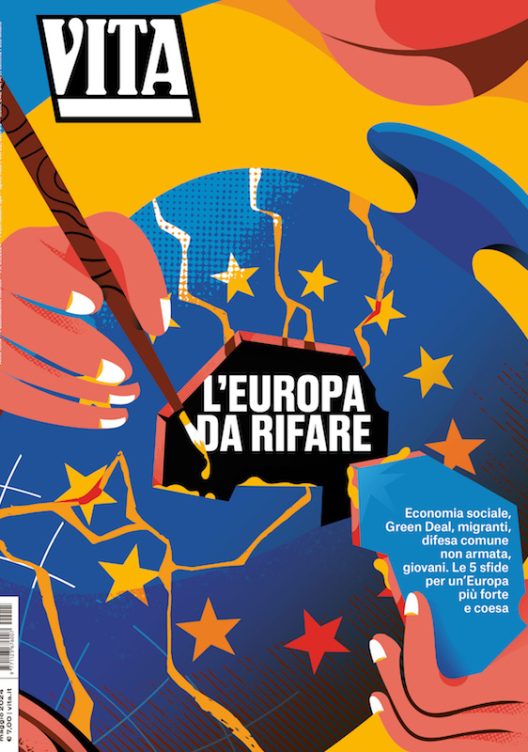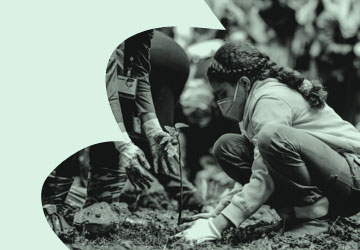Attivismo civico & Terzo settore
On a mission to transform civil society
Interview with Peter Varga, development manager with NESsT, an NGO with an entrepreneurial mission
di Rose Hackman

Peter Varga, a 30 year-old Hungarian Yale graduate with a Master’s degree from the Central European University, is a political scientist and economist with a difference.
For the past five years, he has been enterprise development manager at NESsT’s Budapest branch, a profession that has meant assisting hundreds of civil society organisations in central and eastern Europe into becoming more sustainable through the development of internal social enterprises.
“This could be a solution for many NGOs. If the leaders have made that paradigm shift in their heads that profit is not bad, and can be used for good things as well, then they are capable of developing a social enterprise, even if they lack the skills.”
Now operating in five central European countries and five Latin American ones, NESsT’s expansion over the past few years has seen its activities stay close to its founding core mission of strengthening the non profit sector through the development of sustainable profitable ventures.
Peter Varga answers Vita Europe’s questions about the journey of an extraordinary enterprise.
How did NESsT start out?
We were founded as an American NGO here in Budapest in 1997 by American Lee Davis and Chilean-American Nicole Etchart.
Right after the political changes, a lot of mostly American, but also western European foundations came into Hungary to help set up some kind of civil society infrastructure. Towards the mid-nineties, they began to pack up. The departure of foundations created a financial vacuum. Back then, Nicole Etchart was working at the Johns Hopkins University studying the region, while Lee Davis was on the ground. They found that there was a large quantity of good organizations with good ideas and excellent leaders, but that what was missing was the sustainability element. This is why they founded NESsT: to provide a form of capacity building, as well as financing for long term sustainable income generated strategies.
What makes the development of these strategies possible?
We are seeking an alternative market place for NGOs on three levels. On the market level obviously, which means NGOs not just delivering social services but also NGOs that can cater, on a market based approach, to the needs of low-income and marginalized communities. On the sectoral level, so that there are some kind of financing mechanisms in the countries where we are working in that specifically support social enterprise development. On the organizational level: that these NGOs are capable of creating, managing and implementing social enterprises. Obviously as non profit experts, they may not have the background in business so we, along with other players, need to provide this kind of support.
Would you say that every NGO has the capacity to develop into a social enterprise, or develop a social enterprise aspect to their operations?
Obviously we are not saying that this is a solution for everybody, although it could be. What we ask NGOs to have in place before they start working with us is the willingness to do it. Not every non profit leader is necessarily comfortable with the idea of generating profit. Many leaders are in the sector because they have animosity towards that.
Who approaches who?
It’s a two way thing. Initially it was more us going out, talking about these possibilities and putting the idea of social enterprise in people’s minds and on the map. Now that we have achieved that, NGOs tend to seek us out. We have calls for tender, where we advertise competitions through our own networks, as well as by other means. If NGOs come and see us, we will let them know when the next competition is taking place.
What percentage of income do you think NGOs should aim to have from their social enterprise?
There is no rule of thumb. It ranges from 10-15 per cent up to 91. Every NGO is different and every social enterprise idea is different. In the case of our portfolio, it averages around 25-30 per cent. We promote sustainability and a diversification of funding sources. If social enterprise income were to be an overwhelming majority of an income then that again might not be sustainable. But a good 30 percent for any NGO could be a realistic goal. The money generated by this could go towards their overhead costs – the rest of their funding being much easier to secure through regular means.
What made NESsT select Slovakia, the Czech Republic, Hungary, Romania and Croatia as its European countries to work in?
Before we go to any country, we do a large amount of research. For us to work in a country, there has to be an enabling environment. A legal framework needs to be in place, as well as a consolidated civil society sector which already contains NGOs who are pursuing some kind of income generating activity.
When we started in 1997, we originally set up in Czech Republic, Slovakia,Hungary and Slovenia. We soon realized that Slovenia did not need our kind of support as it was already ahead. In 2005, we extended to Croatia, as we discovered that Croatian NGOs were able to expand to also become social enterprises. Our youngest country in the region is Romania, which we entered in 2007, right around the time they were joining the EU. We felt that civil society had sufficiently matured but also that there was no one else providing the kind of services we provide.
Ideally would you move on from countries once they have been taught the NESsT lesson?
In an ideal world yes. Our long term strategy right now – seeing that social enterprise, with all its advancement, is still quite embryonic – is to stay in all of these countries. NESsT turned ten only two or three years ago, which was also when we expanded from four to ten countries. Again, in the medium run, we’re not really planning to expand our presence in other countries, it is more a question of consolidating our work in the places we already are. And deepen the understanding as well as the funding we have available in these countries so that more and more NGOs can gain from the project.
So how are you funded? Do you practice what you preach?
As an NGO, our funding is quite diverse, which is most certainly what we are trying to promote. About 25 per cent of our income comes from our own social enterprise. This is our consulting arm which does very similar things to what the rest of our organization does, except generally outside of the ten countries we operate in. The rest is divided into foundation, charity and individual giving, as well as corporations and financial institutions, to whom this kind of model is familiar. They can support us, not just with their money but also with their expertise and networks.

